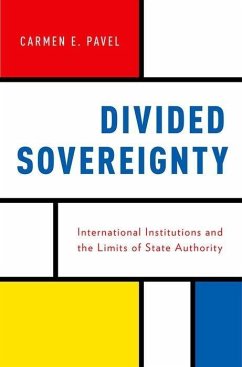- Gebundenes Buch
- Merkliste
- Auf die Merkliste
- Bewerten Bewerten
- Teilen
- Produkt teilen
- Produkterinnerung
- Produkterinnerung
This book explores new institutional solutions to the old question of how to constrain states when they commit severe abuses against their own citizens. The book argues that coercive international institutions can stop these abuses and act as an insurance scheme against the possibility of states failing to fulfill their most basic sovereign responsibilities.
Andere Kunden interessierten sich auch für
![Governors, Agenda Setting, and Divided Government Governors, Agenda Setting, and Divided Government]() Laura A van AssendelftGovernors, Agenda Setting, and Divided Government112,99 €
Laura A van AssendelftGovernors, Agenda Setting, and Divided Government112,99 €![The Divided Mind of American Liberalism The Divided Mind of American Liberalism]() James R HurtgenThe Divided Mind of American Liberalism102,99 €
James R HurtgenThe Divided Mind of American Liberalism102,99 €![Divided We Stand Divided We Stand]() John HorganDivided We Stand55,99 €
John HorganDivided We Stand55,99 €![Migration, Terrorism, and the Future of a Divided Europe Migration, Terrorism, and the Future of a Divided Europe]() Christopher DelisoMigration, Terrorism, and the Future of a Divided Europe86,99 €
Christopher DelisoMigration, Terrorism, and the Future of a Divided Europe86,99 €![European Integration Theory European Integration Theory]() Antje WienerEuropean Integration Theory40,99 €
Antje WienerEuropean Integration Theory40,99 €![No Illusions No Illusions]() Ellen MickiewiczNo Illusions37,99 €
Ellen MickiewiczNo Illusions37,99 €![Divided Cities Divided Cities]() Richard Scholar (ed.)Divided Cities46,99 €
Richard Scholar (ed.)Divided Cities46,99 €-
-
-
This book explores new institutional solutions to the old question of how to constrain states when they commit severe abuses against their own citizens. The book argues that coercive international institutions can stop these abuses and act as an insurance scheme against the possibility of states failing to fulfill their most basic sovereign responsibilities.
Produktdetails
- Produktdetails
- Verlag: Oxford University Press
- Seitenzahl: 240
- Erscheinungstermin: 13. November 2014
- Englisch
- Abmessung: 241mm x 167mm x 22mm
- Gewicht: 454g
- ISBN-13: 9780199376346
- ISBN-10: 0199376344
- Artikelnr.: 47866420
- Herstellerkennzeichnung
- Libri GmbH
- Europaallee 1
- 36244 Bad Hersfeld
- gpsr@libri.de
- Verlag: Oxford University Press
- Seitenzahl: 240
- Erscheinungstermin: 13. November 2014
- Englisch
- Abmessung: 241mm x 167mm x 22mm
- Gewicht: 454g
- ISBN-13: 9780199376346
- ISBN-10: 0199376344
- Artikelnr.: 47866420
- Herstellerkennzeichnung
- Libri GmbH
- Europaallee 1
- 36244 Bad Hersfeld
- gpsr@libri.de
Associate Director & Research Professor, University of Arizona Center for Philosophy and Freedom
* Introduction
* 1. Why Divided Sovereignty?
* 2. Method and Justification
* 3. Outline of the Book
* Chapter 1 Sovereignty, the Social Contract, and the Incompleteness of
the State System
* 1. The Institutions of the Social Contract
* 2. On Sovereignty and Delegation of Authority
* 3. Problems of Institutional Design
* 4. Conceptual and practical Hurdles to Divided Sovereignty
* 5. Conclusion
* Chapter 2 Divided Sovereignty: the Principal-Agent Model
* 1. Sovereignty Limiting Norms and their Current Effects
* 2. Divided Sovereignty: The Principal-Agent Model
* 2.1 The Origins of the Model
* 2.2 The Principle-Agent Model for International Institutions
* 2.3 Delegation
* 2.4 The Role of Consent
* 3. Agency Costs at the International Level
* 4. Why Use Principal-Agent Theory?
* 5. Conclusion
* Chapter 3 Domestic and International Implications: Slavery, Genocide
and Civil War
* 1. The Scope and Limits of International Authority
* 2. Constitutional Interpretation and Change
* 3. Slavery
* 4. Genocide
* 5. Civil Wars and Failed States
* 6. Conclusion
* Chapter 4 Theories and Institutional Facts
* 1. One Step Theorizing: Cosmopolitan Justice
* 2. Two Step Theorizing: The Case of Humanitarian Intervention
* 3. Objections
* 4. Conclusion
* Chapter 5 Romanticizing Institutions
* 1. Cosmopolitan Global Democracy
* 2. Rule of Law Experiments
* 3. Rule of Law for Global Democracy
* 4. Institutional Assumptions and Bureaucratic Pathologies
* 5. Conclusion
* Chapter 6 Institutional Pluralism
* 1. Institutions in International Criminal Law
* 2. Fragmentation and Conflict
* 3. The Benefits of a Pluralist System
* 4. Complex Social Orders
* 5. A Hobbesian Challenge
* 6. Conclusion
* Chapter 7 The Possibility of Rule-Governed Behavior in International
Politics
* 1. Cooperation under Anarchy
* 2. Assumptions and Implications of International Relations Theorizing
* 3. Self-Preservation as the Dominant State Preference
* 4. The Possibility of a Rule-Governed Order
* Conclusion
* 1. Why Divided Sovereignty?
* 2. Method and Justification
* 3. Outline of the Book
* Chapter 1 Sovereignty, the Social Contract, and the Incompleteness of
the State System
* 1. The Institutions of the Social Contract
* 2. On Sovereignty and Delegation of Authority
* 3. Problems of Institutional Design
* 4. Conceptual and practical Hurdles to Divided Sovereignty
* 5. Conclusion
* Chapter 2 Divided Sovereignty: the Principal-Agent Model
* 1. Sovereignty Limiting Norms and their Current Effects
* 2. Divided Sovereignty: The Principal-Agent Model
* 2.1 The Origins of the Model
* 2.2 The Principle-Agent Model for International Institutions
* 2.3 Delegation
* 2.4 The Role of Consent
* 3. Agency Costs at the International Level
* 4. Why Use Principal-Agent Theory?
* 5. Conclusion
* Chapter 3 Domestic and International Implications: Slavery, Genocide
and Civil War
* 1. The Scope and Limits of International Authority
* 2. Constitutional Interpretation and Change
* 3. Slavery
* 4. Genocide
* 5. Civil Wars and Failed States
* 6. Conclusion
* Chapter 4 Theories and Institutional Facts
* 1. One Step Theorizing: Cosmopolitan Justice
* 2. Two Step Theorizing: The Case of Humanitarian Intervention
* 3. Objections
* 4. Conclusion
* Chapter 5 Romanticizing Institutions
* 1. Cosmopolitan Global Democracy
* 2. Rule of Law Experiments
* 3. Rule of Law for Global Democracy
* 4. Institutional Assumptions and Bureaucratic Pathologies
* 5. Conclusion
* Chapter 6 Institutional Pluralism
* 1. Institutions in International Criminal Law
* 2. Fragmentation and Conflict
* 3. The Benefits of a Pluralist System
* 4. Complex Social Orders
* 5. A Hobbesian Challenge
* 6. Conclusion
* Chapter 7 The Possibility of Rule-Governed Behavior in International
Politics
* 1. Cooperation under Anarchy
* 2. Assumptions and Implications of International Relations Theorizing
* 3. Self-Preservation as the Dominant State Preference
* 4. The Possibility of a Rule-Governed Order
* Conclusion
* Introduction
* 1. Why Divided Sovereignty?
* 2. Method and Justification
* 3. Outline of the Book
* Chapter 1 Sovereignty, the Social Contract, and the Incompleteness of
the State System
* 1. The Institutions of the Social Contract
* 2. On Sovereignty and Delegation of Authority
* 3. Problems of Institutional Design
* 4. Conceptual and practical Hurdles to Divided Sovereignty
* 5. Conclusion
* Chapter 2 Divided Sovereignty: the Principal-Agent Model
* 1. Sovereignty Limiting Norms and their Current Effects
* 2. Divided Sovereignty: The Principal-Agent Model
* 2.1 The Origins of the Model
* 2.2 The Principle-Agent Model for International Institutions
* 2.3 Delegation
* 2.4 The Role of Consent
* 3. Agency Costs at the International Level
* 4. Why Use Principal-Agent Theory?
* 5. Conclusion
* Chapter 3 Domestic and International Implications: Slavery, Genocide
and Civil War
* 1. The Scope and Limits of International Authority
* 2. Constitutional Interpretation and Change
* 3. Slavery
* 4. Genocide
* 5. Civil Wars and Failed States
* 6. Conclusion
* Chapter 4 Theories and Institutional Facts
* 1. One Step Theorizing: Cosmopolitan Justice
* 2. Two Step Theorizing: The Case of Humanitarian Intervention
* 3. Objections
* 4. Conclusion
* Chapter 5 Romanticizing Institutions
* 1. Cosmopolitan Global Democracy
* 2. Rule of Law Experiments
* 3. Rule of Law for Global Democracy
* 4. Institutional Assumptions and Bureaucratic Pathologies
* 5. Conclusion
* Chapter 6 Institutional Pluralism
* 1. Institutions in International Criminal Law
* 2. Fragmentation and Conflict
* 3. The Benefits of a Pluralist System
* 4. Complex Social Orders
* 5. A Hobbesian Challenge
* 6. Conclusion
* Chapter 7 The Possibility of Rule-Governed Behavior in International
Politics
* 1. Cooperation under Anarchy
* 2. Assumptions and Implications of International Relations Theorizing
* 3. Self-Preservation as the Dominant State Preference
* 4. The Possibility of a Rule-Governed Order
* Conclusion
* 1. Why Divided Sovereignty?
* 2. Method and Justification
* 3. Outline of the Book
* Chapter 1 Sovereignty, the Social Contract, and the Incompleteness of
the State System
* 1. The Institutions of the Social Contract
* 2. On Sovereignty and Delegation of Authority
* 3. Problems of Institutional Design
* 4. Conceptual and practical Hurdles to Divided Sovereignty
* 5. Conclusion
* Chapter 2 Divided Sovereignty: the Principal-Agent Model
* 1. Sovereignty Limiting Norms and their Current Effects
* 2. Divided Sovereignty: The Principal-Agent Model
* 2.1 The Origins of the Model
* 2.2 The Principle-Agent Model for International Institutions
* 2.3 Delegation
* 2.4 The Role of Consent
* 3. Agency Costs at the International Level
* 4. Why Use Principal-Agent Theory?
* 5. Conclusion
* Chapter 3 Domestic and International Implications: Slavery, Genocide
and Civil War
* 1. The Scope and Limits of International Authority
* 2. Constitutional Interpretation and Change
* 3. Slavery
* 4. Genocide
* 5. Civil Wars and Failed States
* 6. Conclusion
* Chapter 4 Theories and Institutional Facts
* 1. One Step Theorizing: Cosmopolitan Justice
* 2. Two Step Theorizing: The Case of Humanitarian Intervention
* 3. Objections
* 4. Conclusion
* Chapter 5 Romanticizing Institutions
* 1. Cosmopolitan Global Democracy
* 2. Rule of Law Experiments
* 3. Rule of Law for Global Democracy
* 4. Institutional Assumptions and Bureaucratic Pathologies
* 5. Conclusion
* Chapter 6 Institutional Pluralism
* 1. Institutions in International Criminal Law
* 2. Fragmentation and Conflict
* 3. The Benefits of a Pluralist System
* 4. Complex Social Orders
* 5. A Hobbesian Challenge
* 6. Conclusion
* Chapter 7 The Possibility of Rule-Governed Behavior in International
Politics
* 1. Cooperation under Anarchy
* 2. Assumptions and Implications of International Relations Theorizing
* 3. Self-Preservation as the Dominant State Preference
* 4. The Possibility of a Rule-Governed Order
* Conclusion








